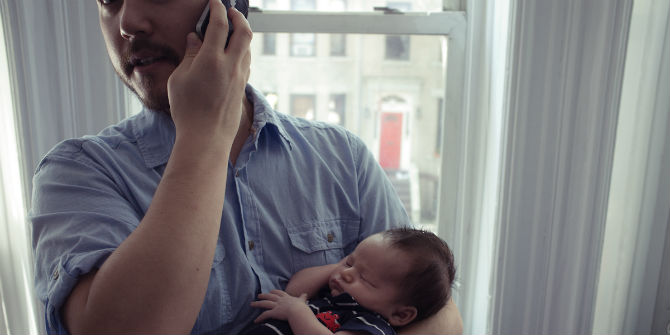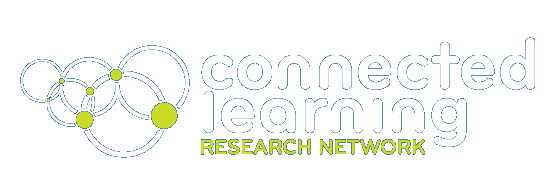The ‘Joys’ of Digital Media in New Parenting
May 16, 2017
PROJECTS: Preparing for a Digital Future
TAGS: Digital Parenting
Maja Sonne Damkjaer explores how new parents are using digital media in their transition to parenthood. As new parents engage with media such as pregnancy calendars and social media such as Facebook, Maja suggests that it is now necessary for parents to decide on a parental communication strategy as they navigate these digital contexts. Maja is a research assistant at the School of Communication and Culture, Aarhus University, Denmark, and her PhD project is part of the research programme, The Mediatization of Culture: The Challenge of New Media, affiliated with the Digital Footprints research group.

Image credit: O. Lin, CC BY-NC 2.0
With the emergence of digital media, parents are faced with new opportunities and challenges. While parents use online resources to find information and support and to connect with family, friends and peers (e.g. on Facebook), not least during pregnancy and the first phase of family life, few studies have explored the fact that more practice and interaction during this transition to parenthood involves digital media.
My research project, Mediatized Parenthood (2012–15), studied how Danish first-time parents use and experience digital media in regard to their new social roles as parents.
The importance of digital media in transitioning to parenthood
Becoming a parent entails major practical, emotional, social and relational changes, e.g. transitioning from couplehood to parenthood, managing childcare, and taking on a new social role as a mother or father.
Today’s new parents have access to information and communication resources with a volume, speed and scope that is unprecedented, providing vast new opportunities for engaging in and communicating about parenthood and family life (e.g. websites and online communities for parents, pregnancy apps and social network sites). Mobile technologies have made the abundance of media types – and their users – constantly available.
Digital media have become an integrated part of transitioning to parenthood, not only as tools for finding information and building or maintaining social relations, but also as part of the rituals that mark the symbolic transition from one social role to another.
Parenthood today is unfolding in a media environment offering new types of experts and advisory bodies and new communication tools and social arenas. While most parents value the wide range of information and communication possibilities, they also identify challenges associated with the role of digital media in transitioning to parenthood.
Mixed attitudes towards digital media resources
One widespread practice during pregnancy was the use of pregnancy calendars, which provide detailed information on the development of the foetus on a daily or weekly basis, accompanied by colourful pictures of life in the womb. One of the mothers said that the pregnancy calendar provided her with a sense of security; another explained that she didn’t really use the information for anything. Instead, it had a symbolic function – like an advent calendar, an enjoyable count-down to birth that helped her relate to her baby and prepare mentally for becoming a mother. So not all pregnant women found these services useful, and some doubted the quality of the information provided.
Likewise, parents contested the value of due date and online parent groups. While some active members (usually mothers) denoted that they found an openness, intimacy and confidentiality they couldn’t find any where else, and used these groups to find advice, socialise and develop their identity as parents, others didn’t want to partake in or use advice from online parent groups, as they found it difficult to separate quality information from anecdotes, old wives’ tales and gossip, and limited their information search to handbooks and health authority websites.
Family bonding and developing parental identity
Parents appreciated being able to engage in with a partner and close family and friends through different digital communication channels. Several fathers underlined how daily texts and photo updates from their partner made them feel close to their baby, and they could also engage with this new parental role while being away from home – this ‘connected presence’ was highly valued. Several fathers as well as mothers also regularly posted updates and photos from their new family life on Facebook, and often couples would tag or comment on each other’s posts or post on each other’s time line. Facebook served as a space for family bonding, and as a place for men to express their new social role as parents – a role men have not traditionally been socialised into, as Western culture primarily equates parenting with motherhood.
New pressures
Intertwining mobile and social media practices in the transition to parenthood was also associated with new types of social pressures and worries. Parents were expected to post photos and share news about their new family life. A mother whose son was born premature received several requests to post photos of him on Facebook but was reluctant to do so: “It is as if life is not fitted for the Facebook format when it comes to this type of seriousness.” Another couple said that the new grandfather had immediately broken the news about the birth of their son and posted photos of him on Facebook. They then had to engage in ‘mending practices’, as some of their friends and relatives were offended because they hadn’t received the news first-hand. At the same time, most parents worried that their smartphones were stealing time and attention away from their babies, and said how they would try to ‘put down the phone’.
Today’s new parents have access to an enormous amount of information and communication resources, but are also experiencing a loss of control and an increased need for guidance as a result of this new pressure to communicate. Embedding mobile and social media in family life means new types of decision-making processes and new layers of reflexivity and ethical considerations related to parenting. Parents not only have to deal with questions of privacy and self-disclosure, but also considerations related to producing, managing, controlling and responding to mediated communication about their children and family life. It has now become crucial for new parents to decide on a parental communication strategy.
NOTE
This article originally appeared on lse.ac.uk. It has been re-posted with permission.

